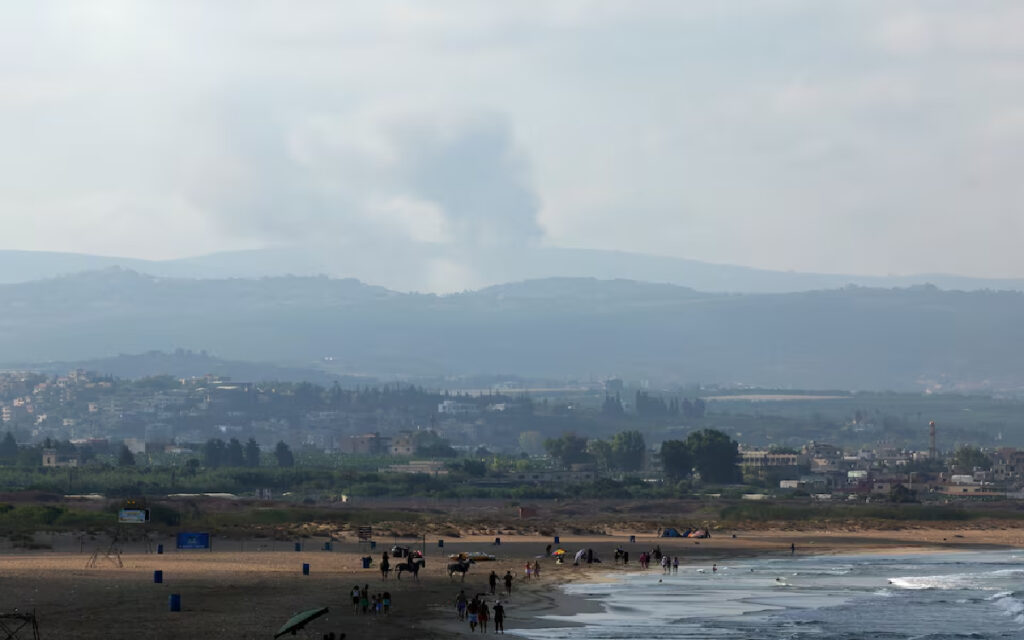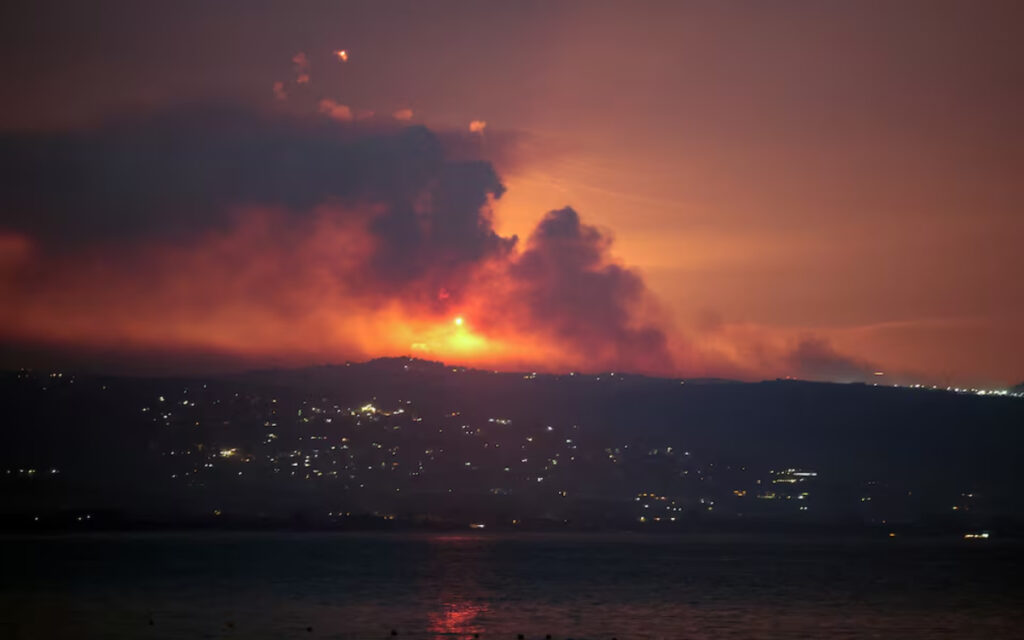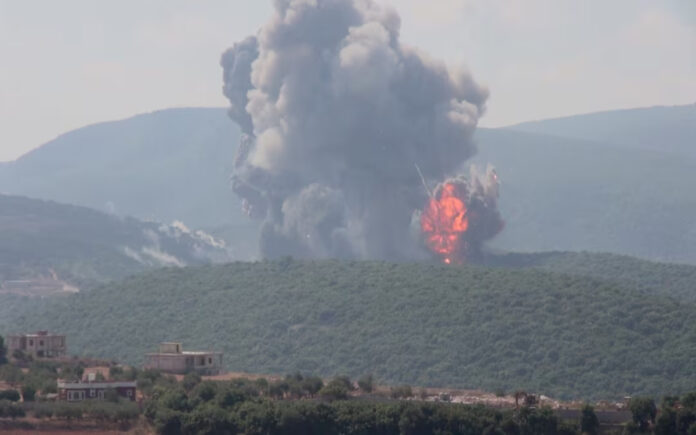Jerusalem/Beirut: Early Sunday, Hezbollah launched hundreds of rockets and drones at Israel, prompting a significant military response from the Israeli Defense Forces (IDF), which struck Lebanon with approximately 100 jets. This exchange marks one of the most intense clashes in over ten months of border conflict.
Missiles streaked through the dawn sky, trailing dark vapors, as air raid sirens sounded in Israel. Explosions lit the horizon and smoke billowed over Khiam in southern Lebanon. In the evening, sirens in Rishon Letsiyon, central Israel, alerted residents to a projectile that crossed from the southern Gaza Strip and landed in an open area. Hamas claimed responsibility for firing an “M90” rocket at Tel Aviv.
The fighting, which coincides with the ongoing war in Gaza, risks escalating into a broader regional conflict involving Hezbollah’s ally Iran and Israel’s key ally, the United States. With confirmed casualties including three deaths in Lebanon and one in Israel, both sides have indicated a desire to avoid further escalation for now, though they have warned of potential future strikes.
Hezbollah leader Sayyed Hassan Nasrallah stated that the group’s barrage was a response to the assassination of senior commander Fuad Shukr last month and that the attack was carried out “as planned.” He noted that Hezbollah would evaluate the impact of its strikes and retained the right to respond further if necessary.
Israeli Foreign Minister said the country did not seek a full-scale war, but Prime Minister Benjamin Netanyahu warned, “This is not the end of the story.” Netanyahu also declared, “We are determined to do everything we can to defend our country… whoever harms us – we harm him.”
Diplomats reported that both sides have signaled a desire to avoid further escalation, with the understanding that the recent exchange was a “done” deal. The recent escalation followed a missile strike in the Israeli-occupied Golan Heights last month that killed 12 youths, leading to the Israeli military’s assassination of Shukr in Beirut.
Hezbollah had delayed its retaliation to allow for ceasefire talks and calibrated its attack to avoid triggering a full-scale war, according to a Hezbollah official. U.S. Defense Secretary Lloyd Austin has ordered two aircraft carrier strike groups to the Middle East, increasing U.S. military presence, while top U.S. General C.Q. Brown visited Israel for talks with military leaders.
In Gaza, Israeli air strikes continued, with at least five Palestinians killed in Gaza City early Monday, as reported by the official Palestinian news agency Wafa. Ceasefire talks in Cairo failed to reach an agreement, with neither Hamas nor Israel accepting proposed compromises. However, a senior U.S. official described the talks as “constructive” and indicated that negotiations would continue.
Also Read | Ukraine Alleges Significant Belarusian Military Buildup Near Border
Intense Bombardment

Israeli air strikes began before Hezbollah’s barrage, according to Nasrallah. Netanyahu stated these “pre-emptive” strikes had thwarted a larger Hezbollah attack, though Nasrallah claimed they had minimal impact. Hezbollah’s strikes targeted an intelligence base near Tel Aviv, while Netanyahu said all drones aimed at a strategic location in central Israel were intercepted.
A Lebanese security source reported at least 40 Israeli strikes hitting southern towns in one of the densest bombardments since the conflict began in October. Hezbollah confirmed the deaths of two fighters in al-Tiri and the Shiite group Amal reported the death of a fighter in Khiam. Israel’s military reported one naval soldier killed and two wounded.
Lebanon’s caretaker Prime Minister Najib Mikati convened a session of the national emergency committee. Flights to and from Ben Gurion Airport in Tel Aviv were suspended for about 90 minutes, with some flights to and from Beirut also halted.
Also Read | North Korea Showcases New Suicide Drones Under Kim Jong Un’s Supervision
Alert Sirens

In northern Israel, warning sirens and explosions were reported as the Iron Dome intercepted rockets from southern Lebanon. Yuval Peleg, 73, from Haifa, suggested that Israel should continue pre-emptive strikes and, if Hezbollah persists, strike decisively to eliminate the threat.
A resident of Zibqeen in southern Lebanon described awakening to the sounds of planes and rockets, likening it to an apocalyptic scene. The White House stated that U.S. President Joe Biden is monitoring the situation and reaffirmed support for Israel’s right to self-defense while working toward regional stability. United Nations Secretary-General Antonio Guterres expressed deep concern and called for an immediate cessation of hostilities.
Egypt and Jordan also warned against further escalation. While the United States provided some intelligence about incoming Hezbollah attacks, it was not involved in Israel’s strikes on Sunday.
Hezbollah had fired missiles at Israel immediately after the October 7 attacks by Hamas gunmen. The two sides have exchanged fire since then, avoiding a major escalation as the Gaza war continues. The balance of this conflict shifted after the Golan Heights strike and Shukr’s assassination, which was followed by the killing of Hamas leader Ismail Haniyeh in Tehran and subsequent vows of reprisal by Iran.



